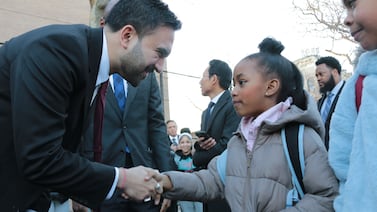Sign up for Chalkbeat’s free weekly newsletter to keep up with how education is changing across the U.S.
The Trump administration has cleared the way for immigration arrests at or near schools, ending a decades-old approach.
Republican and Democratic administrations alike have treated schools and child care centers, along with churches and hospitals, as “sensitive” or “protected” locations where immigration enforcement should only take place when there is an immediate danger to the public.
But U.S. Department of Homeland Security officials announced Tuesday afternoon that they had rescinded the latest version of the policy, which was issued in 2021 by the Biden administration. The news was first reported early Tuesday by Fox News.
A copy of the Homeland Security memo was not immediately available for review.
But in a statement, a Homeland Security spokesperson said that Acting Secretary Benjamine Huffman issued a directive on Monday that rescinded the sensitive locations policy. The spokesperson said the action would help federal authorities enforce immigration law and catch criminals who entered the country illegally. Immigration agents will be asked to use “common sense” in enforcing the law.
“Criminals will no longer be able to hide in America’s schools and churches to avoid arrest,” the statement read.
Since Trump’s reelection, observers anticipated the end of treating certain locations as “sensitive” with respect to immigration enforcement. News reports surfaced in mid-December that the incoming Trump administration was planning to get rid of the policy. Since then, schools have been bracing for the possibility of immigration agents showing up at their doors.
Even before this policy existed, large-scale immigration raids weren’t conducted at schools. But Trump’s policy change paves the way for immigration agents to detain parents during dropoff or pickup, as has happened occasionally in the past.
Immigrant rights advocates worry that could lead to more absenteeism among children with immigrant parents, who may now fear being stopped by immigration agents while driving or walking their kids to school. That happened during the first Trump administration. Advocates also worry about the potential for routine interactions with school police to reveal a student or family’s immigration status, and lead to their deportation.
Some school districts have issued explicit instructions to educators and parents about how school staff should handle an immigration agent’s presence on campus. Some districts have also said they will not permit a federal agent on school premises without a judicial warrant, and that staff will be instructed to call the school system’s lawyer if these agents do show up.
Some of the nation’s largest districts, including Los Angeles and Chicago, have re-upped or expanded existing policies meant to protect immigrant students and families. New York City is scheduled to vote on a resolution this week that would reaffirm a policy preventing school safety agents from collaborating with federal immigration authorities in most cases.
Others, including several Texas school districts near the U.S.-Mexico border, are taking a “wait and see” approach to avoid causing confusion or fear among families. At the same time, immigrant rights advocates say it’s helpful to inform families of their rights and show them how to make a plan in case a parent is detained.
The end of treating schools as sensitive locations is just one of many executive actions on immigration that the new Trump administration has taken since taking office on Monday.
Trump also signed an executive order that seeks to end the automatic right to citizenship for any child born in the U.S. On Tuesday, 18 states announced they were suing to block the policy change.
This story has been updated to include confirmation and comments from the Department of Homeland Security about the policy change.
Kalyn Belsha is a senior national education reporter based in Chicago. Contact her at kbelsha@chalkbeat.org.





